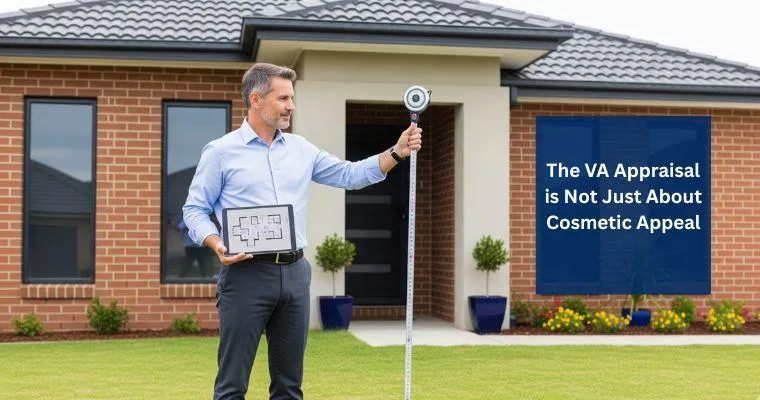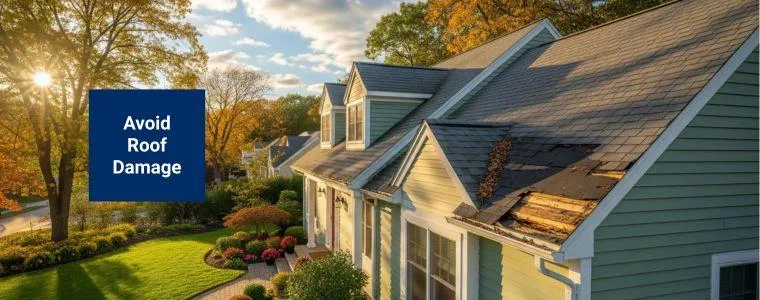What to Avoid in a Home When Obtaining a VA Loan Appraisal
Learn important aspects to know about the VA appraisal and how it protects you.
With an amazing benefit such as the VA loan, there are important details the both veterans and active-duty service members should be aware of. Of course, some of the big highlights are that there is no down payment requirement and no private mortgage insurance with the VA loan. One element, which is important and often less discussed, is the VA appraisal. Before the keys can change hands from the seller to the new buyer, its critical that not only the buyer has a general understanding, but also the individual selling the home to a veteran since the VA appraisal can be a handled a little differently than other traditional appraisals.
Unlike a standard appraisal, which focuses primarily on a home’s market value, the VA appraisal takes an additional step. It ensures the property meets the Department of Veterans Affairs’ Minimum Property Requirements (MPRs), designed to protect the health, safety, and comfort of the veteran buyer. The process is both financial and functional. The appraiser determines whether the home is worth the purchase price and whether it meets the VA’s standards for habitability.
For buyers using a VA loan, understanding what to avoid in a property upfront can prevent delays, added costs, or even deal breaking issues. Whether you are house hunting or preparing a home for sale, here is what you need to know about what not to overlook.
The VA Appraisal is Not Just About Cosmetic Appeal
When touring homes, buyers often fall in love with style including home details such as hardwood floors, updated kitchens and charming exteriors. The VA appraise is looking beneath the surface. Their job is not to comment on the home’s beauty. It is to verify that it’s safe, structurally sound and suitable for living.
That means peeling paint, loose railings, or questionable electrical work can trigger flags even if the house shows well. Cosmetic flaws won’t necessarily tank an appraisal, but if those flaws point to larger safety issues or signs of neglect, they could impact the outcome.

Common Issues That Can Cause Problems
While the VA doesn't require a property to be brand new or perfectly updated, it does require the home to be safe and functional. Here are some of the more common issues that tend to cause snags in VA loan appraisals:
1. Inadequate or Non-Functional Utilities
The home must have a safe and working electrical system, running water, adequate heating (and cooling where applicable), and functioning sanitation facilities. If the furnace is broken, the plumbing leaks, or the home lacks electricity, that’s a red flag. In some cases, utilities that are turned off during the appraisal will lead to a suspension until the systems can be tested in working order.
2. Roof Problems
The roof doesn’t need to be new, but it does need to be in good condition with no active leaks. If an appraiser notices sagging, missing shingles, or visible signs of water intrusion, they may require repairs before the loan can move forward. A roof that “might” last a few more years isn’t always good enough—it needs to be expected to last “reasonably” into the future without immediate attention.

3. Structural Integrity
Any signs of foundation issues, termite damage, or significant water intrusion can stop the appraisal process in its tracks. Cracks in the foundation, sloping floors, or evidence of shifting walls suggest bigger issues that need evaluation. The VA doesn’t require a structural inspection in every case, but if the appraiser suspects a problem, they may require one before the loan is approved.
4. Safety Hazards
The VA is particularly concerned about conditions that pose safety risks to the occupants. This includes missing handrails on staircases, broken windows, exposed wiring, and anything that could present a fire hazard. It also includes environmental hazards like mold, asbestos, or lead-based paint, especially in homes built before 1978.

5. Incomplete Construction or Repairs
Homes that are mid-renovation or have incomplete construction projects are problematic. A property must be “move-in ready,” meaning it’s fully finished and suitable for immediate occupancy. Exposed drywall, missing flooring, or partially installed kitchen cabinets can all delay or derail the appraisal process.
6. Water Damage or Moisture Problems
Evidence of water intrusion, whether it’s a leaky basement or stains on the ceiling, raises questions about the home’s condition. The VA appraiser will want to know that any moisture issues have been addressed and won’t compromise the integrity of the structure or the safety of the occupants.

Don’t Rely on “As-Is” Sales Contracts
In some real estate transactions, especially in hot markets, buyers may feel pressure to accept a property “as-is.” That can come with a risk when using a VA loan. Even if the seller has made it clear they won’t make any repairs, the VA still requires those repairs to be made before the loan can be finalized if the home doesn’t meet the MPRs.
This puts VA buyers in a difficult position as either the buyer can walk away or pay out of pocket for repairs on a home they don’t yet own. That’s why it’s essential to go into the process informed and to work with a real estate agent who understands the VA loan’s unique requirements.
Manufactured and Unique Properties: Proceed with Caution
Not all properties are treated equally under the VA loan program. Manufactured homes, for instance, must meet specific guidelines, including being permanently affixed to a foundation and classified as real property. If you're looking at tiny homes, barndominiums, or other nontraditional structures, the odds of running into appraisal issues go up.
That’s not to say these properties are impossible to finance with a VA loan, but they will often require extra scrutiny. It’s wise to check with a lender or mortgage broker early in the process to avoid pursuing a property that may never qualify. You can avoid wasting time and money going through a process that may not come to fruition.
What Can Be Done If the Property Falls Short?
If the VA appraiser finds issues that violate the MPRs, they will usually note the problems in their report and condition the loan approval on the completion of repairs. In some cases, the seller agrees to make the repairs, especially if the buyer is offering full price or close to it. In other cases, negotiations fall through.
Most of the time, the seller must complete the repairs before closing, and the appraiser may have to re-inspect the property to confirm the work is done. If you're in a position where you want the home and the seller isn't willing to make the necessary repairs, you could be stuck in a position where you may need to make the repairs before closing. In some cases, a repair can be made within a certain number of days after a closing. This is a case by case situation.
Be Proactive, Not Reactive with Your VA Loan
The VA appraisal isn’t designed to complicate the buying process. It is actually intended to protect veterans and ensure they are getting a safe, livable home that justifies its price. However, surprises during the appraisal can cause stress, delays, and even lost deals if you’re not prepared.
If you're a veteran buying a home with a VA loan, the best thing you can do is be proactive. Work with an experienced VA loan specialist and a real estate agent who understands the nuances of the process. Ask about potential red flags before making an offer, and don't hesitate to walk away from a property that looks like more trouble than it’s worth.
The VA loan is one of the best tools available to help you build a stable and secure future. By knowing what to avoid—and what to look for—you can make that future a reality with fewer surprises along the way.
For more information on a VA loan, please contact us and we will be happy to assist you.
Mortgage Insight:
Purchasing a Home with a Conventional Loan
VA Loan Success Story with Eric and Denise
How a VA Loan in Ocala, FL changed a Family's Financial Future
How Much Home Can I Afford with a VA Loan?
Can I Use My VA Loan in a Chapter 13 Bankruptcy?
Can a Fiance or Kids be on a VA Loan?
Veterans Who Buy Homes See Far Higher Net Worth Than Renters
How Much Mortgage Insurance Can I Save with a VA Loan?
What to Avoid in a Home When Obtaining a VA Loan Appraisal?
Duplex Property in Fort Lauderdale Quadruples in Value and Leaves a Nest Egg to the Heirs
How a California Remote Worker Obtained a Mortgage to Relocate to Boca Raton, FL
What's the Average Mortgage in Fort Lauderdale, FL?
What Factors are in my Credit Score for a Mortgage?
What Documents Do You Need for a No Income Verification Mortgage?
Restaurant Owner Obtains Self-Employed Home Loan
Can a General Contractor Obtain a No Income Verification Mortgage?
Is a HELOC or a Cash Out Refinance Better to Pay for a New Roof?
Can a Collection Prevent Me from Getting a Mortgage?
Do I Have to Make Mortgage Payments if I Lose My Job?

Your mortgage journey.
Various loan type options including:
Conventional loan
FHA loan
VA loan
Self-employed loan options
No income verification for investors
Benefits of Homeownership
Homeownership is a significant milestone and a decision that offers many advantages. In addition to providing a place to call your own, owning a home brings financial stability, personal fulfillment, and a sense of belonging. Mortgage Group has been helping individuals and families obtain homeownership, guiding them through the process and obtaining referrals to help their family and friends accomplish the same.

Purchase
Get pre-approved to purchase your first home, second home or upcoming investment property.
Refinance
Own a property and interested in lowering your payment? Need to take cash out? Refinance with confidence.
Connect with Us
Our experienced team with be happy to speak with you, and walk you through each step of the process.

Providing mortgage solutions to help you with your home.
Mortgages can be complicated and have many moving parts. Let our team help you!
Contact Us
It only takes a few moments to reach out and have an initial conversation.
Know the Next Steps
Our team will work with you to find the best way to achieve your home loan goals.
Find Your Home and Get Your Loan
Our team will be prepared to move with the next steps once you have secured your home purchase contract.
Houses

Townhomes

Condos

Multi-Units

Read helpful information to assist you with obtaining a mortgage.
How much home can I afford?

Which home loan program is right for me?

Contact our team today.
1-800-583-5305
© Copyright 2026 E Mortgage Capital, Inc.. All rights reserved.
- 1416824 | E Mortgage Capital, Inc.
Notice To Texas Loan Applicants: Consumers wishing to file a complaint against a mortgage banker, or a licensed mortgage banker residential mortgage loan originator, should complete and send a complaint form to the Texas Department of Savings and Mortgage Lending, 2601 North Lamar, Suite 201, Austin, TX 78705. Complaint forms and instructions may be obtained from the department’s website at www.sml.texas.gov
A toll-free consumer hotline is available at 1-877-276-5550. The department maintains a recovery fund to make payments of certain actual out of pocket damages sustained by borrowers caused by acts of licensed mortgage banker residential mortgage loan originators. A written application for reimbursement from the recovery fund must be filed with and investigated by the department prior to the payment of a claim. For more information about the recovery fund, please consult the department’s website at
www.sml.texas.gov

